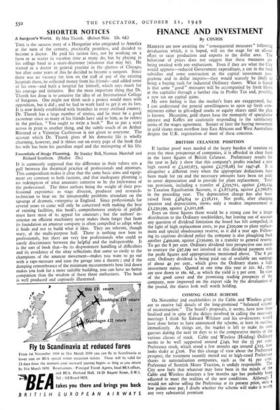FINANCE AND INVESTMENT
By CUSTOS
MARKEIS are now awaiting the "consequential measures" following devaluation which, it is hoped, will set the stage for an all-out effort to raise production and exports to the dollar area. The behaviour of prices does not suggest that these measures are being awaited with any enthusiasm. Even if they are what the City would approve—reduced Government expenditure, a cut in the food subsidies and some contraction in the capital investment pro- gramme and in dollar imports—they would scarcely be likely to bring a buying rush for industrial Ordinary shares. What is feared is that some "good" measures will be accompanied by fresh blows at the capitalist through a further rise in Profits Tax and, possibly, a new tax on capital gains.
My own feeling is that the market's fears are exaggerated, but I can understand the general unwillingness to open up fresh com- mitments either in gilt-edged stocks or equity shares until the plan is known. Meantime, gold shares have the monopoly of speculative interest and Kaffirs are cautiously responding to the satisfactory terms of the wages agreement. Sooner or later the buying movement in gold shares must, overflow into East Africans and West Australiant despite the U.K. registration of most of these concerns.
BRITISH CELANESE POSITION
If further proof were needed of the heavy burden of taxation on even the most prosperous of companies, it is afforded in clear form in the latest figures of British Celanese. Preliminary results for the year to July 2 show that this company's profits reached a new high record at £3,107,673, against £2,778,083 for 1947-48. It is altogether a different story when the appropriate deductions have been made for tax and the necessary amounts have been set aside to cover depreciation and to provide for plant replacement. Total tax provision, including a transfer of £250,711, against L163,121, to Taxation Equalisation Account, is £1,877,074, against £1,766,875 in the preceding year. The depreciation charge has also been raised from £484,654 to £538,111. Net profit, after charging taxation and depreciation, shows only a modest improvement at £1,230,599, against £1,011,208.
Even on those figures there would be a strong case for a larger distribution to the Ordinary stockholders, but leaving out of account any question of dividend limitation the board has felt compelled, in the light of high replacement costs, to put £2oo,000 to plant replace- ment and special obsolescence reserve, as it did a year ago. Follow- ing its cautious dividend policy the company is also ploughing back another £400,000, against £15o,000, in a transfer to general reserve. To get the 8 per cent. Ordinary dividend into perspective one needs to contrast the £97,299 net involved in this dividend payment with the profit figures and appropriations mentioned above. The 8 per cent. Ordinary dividend is being paid out of available net earning, of about 40 per cent., which gives the Ordinary shares a high investment status. Quoted at one time this year at 22s. 6d., the are now down to t6s. 6d., at which the yield is 5 per cent. In yin' of the good cover and the promising trading prospects of tit: company, now improved on the export side by the devaluation ot the pound, the shares look well worth holding.
COMING CABLE SCHEME
On November znd stockholders in the Cable and Wireless group are to receive full details of the long-promised "balanced scheme of reconstruction." The board's proposals, it seems, have now been finalised and in spite of the delays involved in calling the neces,ary meetings I think Sir Edward Wilshaw and his co-directors would have done better to have announced the scheme, at least in outline, immediately. As things are, the market is left to make its own guesses during the next to days as to the comparative merits of the various classes of stock. Cable and Wireless (Holding) Ordinary seems to be well supported around £240, but the 51 per cent. Preference stock, which stood a few months ago around £115,
looks shaky at L106. For this change of view about the Preference prospect, the treatment recently meted out to high-rated Preference shares in nationalisation companies, such as the 61- per cent. Preference of Scottish Motor Traction, is unduly responsible. 'The City now feels that whatever may have been in the minds of the Cable and Wireless directors a few months ago has probably been adjusted to meet the realities of the new conditions. Although 1 now would not advise selling the Preference at its present price, onlY few points over par, I doubt whether the scheme will make it worth any very substantial premium


































 Previous page
Previous page